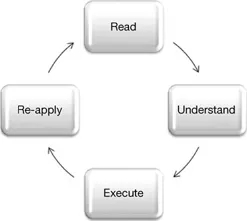![]()
CHAPTER
1
Starting with this chapter, there will be a list of key learning objectives for each chapter. Many readers might think it will be easier and certainly quicker to skip the learning objectives section. “After all,” some might reason, “the points will obviously be repeated in the text that follows.” However, an early understanding of the author’s intent is actually a positive reinforcement to more effective reading, and it is also a discipline worth acquiring in preparation for understanding the Designer’s and Owner’s intention within the contract documents.
Here, then, are the key learning objectives of this chapter.
Student learning outcomes
Upon completion the student should be able to…
• recognize there are three phases to contract administration: (1) read the contract, (2) understand the contract, and (3) execute the contract
• know the importance of applying lessons learned to future projects
• evaluate the importance of schedule, cost, and quality in relation to the contract documents
• analyze the other party’s needs in relation to the contract documents.
Figure 1.1 30th Street Station and Cira Center, Philadelphia
Photo credit: Charles W. Cook
The neoclassical columns of 30th Street Station in Philadelphia contrast with the silver glass façade of the Cira Center that at times seemingly blends with the sky it reflects. Built almost eight decades apart, the two structures are a reminder of how different construction has become over the millennia since the ancient Greeks advanced the use of “post and beam” construction. In that time period, the relationship of Designers and Constructors has evolved tremendously. No longer are buildings the products of individual “Master Builders,” who took on the task of both design and execution while directing a crew of craft workers. Now most structures are a joint effort of several corporate entities bound together by complex legal documents that require considerable understanding and attention to details.
How well the details of the construction process are handled and the final structure successfully realized reguires diligence and commitment by each and every member of a construction team assigned to the task of contract administration.
Whether these are the best of times or the worst of times depends a great deal on how we approach the times. This is not just a textbook. This is also a workbook, providing you with a balance of both theory and practice. Case facts and compensation figures may be important to recognize, but how we react to contract conditions and, particularly, how we handle what some term “killer clauses” is of far greater importance to our own success and the successful completion of the projects for which we are responsible.
The Contract Administrator is helping to change the world, one “put in place a unit at a time,” but, to do so effectively, he/she must read the contract one paragraph, and even one sentence or clause, at a time. The devil is only in the details that we do not know. Knowing all the details, however, is useless unless we know what to do with them. Knowing what to do with them is helpful, but knowing how we will handle difficult situations is of far greater importance.
Good contract administration depends on three phases: (1) reading the contract, (2) understanding the actual requirements, and (3) executing to a successful conclusion. Successfully doing this on one contract will provide the Contract Administrator with a fourth phase leading to even more success when the knowledge and experience gained from one project is applied to the next contract to be administered in a continuous quality improvement process.
Figure 1.2 Three phases plus one in continuous improvement of contract administration
Figure 1.3 Boilerplate language
Photo credit: Charles W, Cook
Copper, brass, or tin plates have been affixed to fuel storage tanks and boilers since the beginning of the Industrial Revolution. Eventually advertisers developed the practice of sending copper plates of printing to newspapers to include as their standard portion of their advertisements. Seeing the resemblance to the metal “boilerplates,”the standard portion of the advertising became known as”boilerplates.”From that it became a short jump for printers to call the standard portion of contracts “boilerplates.” For many Contract Administrators, the boilerplate language may become repetitive and something one is inclined to skip, but within the standard language some important issues might be found, particularly if there have been changes made to the original “boilerplate” contract wording.
Note: Within the text, when an important word is introduced, it will be in bold (e.g. boilerplate in the above box). The reader is encouraged to read the text in relation to what is being discussed. At the end of each chapter the key words will be repeated. Definitions can be found in the glossary and the reader can review using the flash card exercises on the Companion Website.
Exercise 1.1
Take a moment
Read a contract
At the back of this book you will find a sample blank contract in Appendix I. The AIA and the ConsensusDOCS contracts are certainly more widely used pre-printed contracts. We are using in this exercise a sample contract the reader has never seen before. It is a contract to be used between a General Contractor and a Subcontractor, The contract contains many basic but important elements of construction contracts we will be discussing in later chapters of this book.
Take a moment now, however, to read the contract before answering the questions that follow on the next page.
After you have read the contract in Appendix I, continue.
You may have thought the questions would be about specific clauses or requirements of the contract, but we first have to understand our own approach to the most fundamental aspect of reading a contract, and that is reading, itself.
In answering the following questions, be honest with yourself. This is not a test, but an opportunity to recognize our own challenges. It is through understanding ourselves that we can make choices to improve our value to others.
1.Were you solely concentrating on reading, with no competitors for your full attention (e.g, television, radio, e-mail, text messages, or iTunes)?
2.Were you able to tune out exterior noises in your environment that could be considered distracting or even become interruptions (e.g, e-mail or text alerts)?
3.Did you highlight portions of the contract or make notes?
4.Did your concentration wander to other important things you have to do?
5.If you did not understand something, did you make a note so you could somehow resolve it later?
6.Did you ever feel bored or that reading the whole contract was tedious?
7.Did you read the whole contract (or any of the contract) before you skipped back to these questions?
As you go forward, you might also want to recognize how you “read” this text. As fundamental a skill as reading is for most of us, it can often be neglected. We tend to take shortcuts and even permit distractions to impair our complete concentration. When it comes to the “devil in the details” of a contract or understanding a text, missing or skipping over something important can become critical and even costly for the Contract Administrator....



